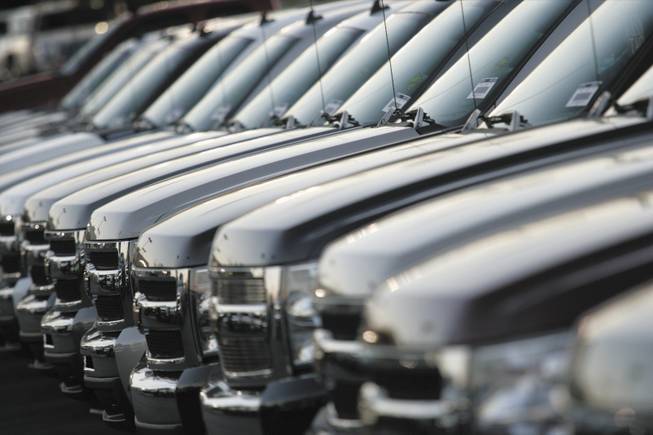Friday, Nov. 21, 2008 | 2 a.m.
Democrats postpone auto industry bailout
Reader poll
WHAT HAPPENED
For $25 billion in aid, Democrats demand a recovery plan from Detroit’s Big Three in 12 days.
WHAT REID SAID
“The sad reality is that no one has come up with a plan that can be passed by the House and Senate … ”
AT STAKE LOCALLY
Fewer visitors are coming to Vegas. If more people lose jobs, tourism numbers could keep dropping.
Senate Majority Leader Harry Reid knew on Thursday that Congress had not been at its finest this week as it weighed rescue of the Big Three automakers.
In Searchlight, or even Las Vegas, it’s tough to explain why ordinary taxpayers should shell out $25 billion to bail out an auto industry whose executives had just flown to Washington on three separate corporate planes, Reid said.
Without public support at home or votes on the Hill, Reid and House Speaker Nancy Pelosi abruptly shelved the bailout plan Thursday afternoon, buying time until Congress resumes in December.
Consider that an action based on a lesson learned last month: Washington can’t get too far ahead of popular opinion on economic rescues. Americans are suffering a bit of bailout fatigue as last month’s $700 billion Wall Street rescue morphs and changes, stocks still tumble and homes are foreclosed.
“What happened in Washington this week hasn’t been good,” Reid said at a hastily called news conference with Pelosi and other Democratic leaders. “The sad reality is no one has come up with a plan that can be passed by the House and Senate and signed by the president.”
Nevada’s lawmakers have been skeptically noncommittal on the bailout bills. Republican Sen. John Ensign told MSNBC, “You can’t just give money to the Big Three automakers without them completely restructuring.”
Democratic Rep. Shelley Berkley remains concerned about losing the Big Three, her spokesman said, but she wants to “ensure taxpayer dollars are protected.”
Republican Rep. Dean Heller, who serves at the center of the action on the House Financial Services Committee, has declined to discuss his views on this topic with the Sun.
Dina Titus, the Democratic Congresswoman-elect, characterized the general feeling in Washington as: “You’ve got to have, first, accountability,” and the funds must be “used in a way to make the companies viable.”
Titus won’t be eligible to vote on the issue next month because she doesn’t take office until January. But she is watching closely, especially as her district is home to both an auto mall and a Ford credit facility.
Around the rest of the state, the auto industry is not a large part of the workforce, according to Nevada labor statistics. Fewer than 1 percent of the jobs statewide, some 10,800, are in auto dealerships. If Detroit goes belly up, the Strip nor Nevada’s gold mines are going bust.
Yet if lawmakers from any state should take a broader interest in global economics, it is those from Nevada, which derives most of its economy from people living elsewhere who have money to spend on fun.
Visitors to Las Vegas have dropped steadily this year the economy tanked. If GM, Ford or Chrysler go bankrupt, as some say they might without Washington’s aid, millions of jobs could be jeopardized.
Michigan Democratic Sen. Debbie Stabenow said Thursday one in every 10 American jobs is tied to the Big Three. That’s a lot of potentially out-of-work slot players.
Professor Keith Schwer, director of UNLV’s business and economic development center, said when a crisis of consumer spending hits an economy as is happening now, travel and tourism are among the first to go.
On a more parochial level, the 115 new-car dealerships in Nevada contribute 16 percent of the state’s retail sales tax, according to an industry group, no small change when the state coffers are empty.
Nevada’s 7.3 percent unemployment rate is steadily climbing, and could hit a Depression-like 10 percent before the economy turns around, experts say.
The number of auto industry jobs in Nevada has declined from 11,400 in the first quarter of 2007 to 10,800 in the first quarter of 2008, the most recent comparison available from the state.
That’s nearly $12 million in lost wages and does not reflect the recent closure of several car dealers in both the northern and southern parts of the state, according to labor officials and news reports.
Jesse Bigley, a state labor economist, said even though the auto industry does not make up a significant part of the Nevada employment picture, “More jobs would be nicer than less jobs.”
Reid has been steadily promoting the automotive bailout despite popular skepticism over the prospect of throwing money at what many see as a backward industry in grave need of innovation and greener vehicles.
Reid’s spokesman notes that for every Nevadan without a job, “we’re going to have to provide services for them that the state is having a hard time paying for.”
The state budget is in such trouble that the governor is considering cutting it by one-third.
On Thursday afternoon, as Reid punted the issue to next month, auto-state lawmakers were clearly disappointed. Their staffs had been working late hours on a bipartisan deal they were about to announce as Reid and Pelosi intercepted the news conference with their own announcement that no votes would be held until December.
“This would have been a wonderful Thanksgiving present for millions of Americans,” said Sen. George Voinovich, an Ohio Republican. “There are a lot of worried people out there.”
Sen. Carl Levin, Michigan’s other Democrat, said “Now this is right smack in the Congress’ lap.”


Join the Discussion:
Check this out for a full explanation of our conversion to the LiveFyre commenting system and instructions on how to sign up for an account.
Full comments policy